A deal within reach, President Joe Biden and Congress’ top Democrats edged close to sealing their giant domestic legislation, as they worked to scale back the measure and determine how to pay for it. The bill, which was originally proposed at a $3.5 trillion figure and contained funding for paid family leave, education and climate programs, has been paired with a $1 trillion infrastructure bill, which received widespread bipartisan support when it passed the Senate earlier this summer.
 “I do think I’ll get a deal,” Biden told CNN’s Anderson Cooper on Thursday night during a Town Hall Meeting, strongly signaling his belief that progressives and moderates, two wings of the Democratic caucus that have been at odds with one another, are reaching an accord on the Build Back Better bill, a sweeping bill that aims to expand the social safety net.
“I do think I’ll get a deal,” Biden told CNN’s Anderson Cooper on Thursday night during a Town Hall Meeting, strongly signaling his belief that progressives and moderates, two wings of the Democratic caucus that have been at odds with one another, are reaching an accord on the Build Back Better bill, a sweeping bill that aims to expand the social safety net.
Biden’s town hall capped off what has been the most momentous week of negotiation in months, with the president acquiescing to losing some key programs from his initial $3.5 trillion wish list, in order to meet those moderates calling for less government spending. The acknowledgement of the concessions could send a signal to Democrats that a deal on the package, which has been whittled from Biden’s $3.5 trillion wish list to just under $2 trillion, is imminent.
The two pieces of legislation crucial to Biden’s agenda have been stalled as moderates and progressives have haggled over the price tag of the Build Back Better bill — which requires no Republican support thanks to the Senate’s budget reconciliation process — and the order in which both bills would be passed.
“We’re down to four or five issues,” Biden said of the ongoing negotiations, but did not detail what those issues are. “I think we can get there. It’s all about compromise,” Biden said, adding: “Compromise has become a dirty word, but … bipartisanship and compromise still has to be possible.”
In order to reach an accord, the size of the sweeping 10-year spending plan has been whittled down to somewhere in the neighborhood of $2 trillion, and President Biden laid out Thursday evening what’s in it — and, importantly, what’s not. For instance, the paid leave provision has been reduced to four weeks from the originally proposed 12 weeks. “It is down to four weeks,” Biden confirmed. “The reason it’s down to four weeks is I can’t get 12 weeks.”
Biden also noted that it might be a “reach” to include dental and vision coverage in Medicare, a progressive priority opposed by moderate Sen. Joe Manchin, D-W.Va., one of the key centrist senators in the caucus. Though Biden detailed Manchin’s opposition to a number of the bill’s programs, including that he “has indicated that they will not support free community college,” another of the bill’s provisions, the president called him “a friend.”
“Joe is not a bad guy,” Biden said. “He is a friend. He has always at the end of the day come around and voted.” Biden noted that “one other person” indicated they would not support the free community college provision, and said that Democrats are looking into expanding Pell grants to help bridge the gap. “It’s not going to get us the whole thing,” Biden said, but noted that he would be forging ahead with his free college education plans in the coming months.
“I’m gonna get it done,” Biden pledged. “And if I don’t, I’m going to be sleeping alone for a long time,” referring to his wife, first lady Dr. Jill Biden, an educator and staunch education advocate. Of fellow moderate Sen. Kyrsten Sinema of Arizona, Biden also had kind words – “She’s as smart as the devil” – praising her support for some of the bill’s economic proposals.
He did, however, note that Sinema is “not supportive where she says she won’t raise a single penny in taxes on the corporate side and on wealthy people.” Biden said that in an evenly divided Senate, every senator’s vote is crucial: “Look, in the United States Senate, when you have 50 Democrats, every one is the president.”
President Biden noted the importance of combatting climate change, calling it “the existential threat to humanity” and pledging that he will debut his plans to get to “net zero emissions” at the upcoming United Nations Climate Change Conference, COP26, in Glasgow, Scotland, at the end of the month.
Biden touted the fact that on his first day in office, he rejoined the Paris climate accord, and said that he is “presenting a commitment to the world that we will in fact get to net zero emissions on electric power by 2035 and net zero emissions across the board by 2050 or before.” “But we have to do so much between now and 2030 to demonstrate what we’re going to do,” he pledged. The president also said that corporations must pay their fair share of taxes. The U.S., Biden said, is “in a circumstance where corporate America is not paying their fair share.”
“I come from the corporate state of the world: Delaware,” Biden said. “More corporations in Delaware than every other state in the union combined. Okay? Now, here’s the deal, though. You have 55 corporations, for example, in the United States of America making over $40 billion, don’t pay a cent. Not a single little red cent. Now, I don’t care — I’m a capitalist. I hope you can be a millionaire or billionaire. But at least pay your fair share. Chip in a little bit.”
Bided added that corporate leaders know “they should be paying a little more” in taxes. “They know they should be paying a little more than 21% because the idea that if you’re a school teacher and a firefighter you’re paying at a higher tax rate than they are as a percentage of your taxes.”
Biden met at the White House on Friday with House Speaker Nancy Pelosi, and Senate Majority Leader Chuck Schumer joined by video call from from New York, trying to shore up details. The leaders have been working with party moderates and progressives to shrink the once-$3.5 trillion, 10-year package to around $2 trillion in child care, health care and clean energy programs.
Pelosi said a deal was “very possible.” She told reporters back at the Capitol that more than 90% of the package was agreed to: The climate change components of the bill “are resolved,” but outstanding questions remained on health care provisions.
No agreement was announced by Friday’s self-imposed deadline to at least agree on a basic outline. Biden wants a deal before he leaves next week for global summits in Europe. Pelosi hoped the House could start voting as soon as next week, but no schedule was set.
Sticking points appear to include proposed corporate tax hikes to help finance the plan and an effort to lower prescription drug costs that has raised concerns from the pharmaceutical industry. Democrats are in search of a broad compromise between the party’s progressives and moderates on the measure’s price tag, revenue sources and basic components.
At the White House, the president has “rolled up his sleeves and is deep in the details of spreadsheets and numbers,” press secretary Jen Psaki said. Vice President Kamala Harris sounded even more certain. On a visit to New York City, she said tensions often rise over final details but “I am confident, frankly — not only optimistic, but I am confident that we will reach a deal.”

 PM Narendra Modi tweeted: “The journey from anxiety to assurance has happened and our nation has emerged stronger, thanks to the world’s largest vaccination drive.”
PM Narendra Modi tweeted: “The journey from anxiety to assurance has happened and our nation has emerged stronger, thanks to the world’s largest vaccination drive.” Deputy Assistant Attorney General Arun G. Rao of the U.S. Department of Justice Civil Division’s Consumer Protection Branch, together with colleagues from the Consumer Protection Branch and the Federal Bureau of Investigation (FBI), met this week with Central Bureau of Investigation (CBI) officials in New Delhi to further strengthen law enforcement cooperation.
Deputy Assistant Attorney General Arun G. Rao of the U.S. Department of Justice Civil Division’s Consumer Protection Branch, together with colleagues from the Consumer Protection Branch and the Federal Bureau of Investigation (FBI), met this week with Central Bureau of Investigation (CBI) officials in New Delhi to further strengthen law enforcement cooperation. In early October, Ayyub was rushed to the hospital in the middle of the night with a suspected heart attack. She remembers screaming to doctors in her hospital bed: “I’m dying.” The scare turned out to be a palpitation, and she was prescribed blood pressure medication. “It happened because I was fearful of my life,” Ayyub, 37, says in a phone interview with TIME two weeks later. “I was just tired of this existence.”
In early October, Ayyub was rushed to the hospital in the middle of the night with a suspected heart attack. She remembers screaming to doctors in her hospital bed: “I’m dying.” The scare turned out to be a palpitation, and she was prescribed blood pressure medication. “It happened because I was fearful of my life,” Ayyub, 37, says in a phone interview with TIME two weeks later. “I was just tired of this existence.” With temperatures rising and extreme weather occurring across the globe, all eyes at the 2021 United Nations Climate Change Conference will be on China, the leading producer of greenhouse gases, and the United States, the largest emitter both historically and on a per capita basis.
With temperatures rising and extreme weather occurring across the globe, all eyes at the 2021 United Nations Climate Change Conference will be on China, the leading producer of greenhouse gases, and the United States, the largest emitter both historically and on a per capita basis. In 2017, former president Donald Trump released several thousand
In 2017, former president Donald Trump released several thousand  The GHI score is calculated on four indicators — undernourishment; child wasting (the share of children under the age of five who low weight for their height); child stunting (children under the age of five who have low height for their age) and child mortality (the mortality rate of children under the age of five).
The GHI score is calculated on four indicators — undernourishment; child wasting (the share of children under the age of five who low weight for their height); child stunting (children under the age of five who have low height for their age) and child mortality (the mortality rate of children under the age of five). Coincidence?
Coincidence?  Binghamton University Professor of Political Science Olga Shvetsova
Binghamton University Professor of Political Science Olga Shvetsova In Washington, where policymakers have been grappling with the fallout from the sudden Taliban takeover of Kabul in August and the scrambled evacuation that followed, the focus has shifted to identifying the mistakes made in the war in Afghanistan. Washington is taking a hard look at where things went wrong — and Pakistan, given its long history with the Taliban, is part of that equation.
In Washington, where policymakers have been grappling with the fallout from the sudden Taliban takeover of Kabul in August and the scrambled evacuation that followed, the focus has shifted to identifying the mistakes made in the war in Afghanistan. Washington is taking a hard look at where things went wrong — and Pakistan, given its long history with the Taliban, is part of that equation. She further said, “I have always appreciated frankness. There is no need to speak to me through the media. So let us all have a free and honest discussion. But what should get communicated outside the four walls of this room is the collective decision of the CWC.”
She further said, “I have always appreciated frankness. There is no need to speak to me through the media. So let us all have a free and honest discussion. But what should get communicated outside the four walls of this room is the collective decision of the CWC.” Shri Muraleedharan, who officially took charge as Minister of State for External Affairs and Minister of State for Parliamentary Affairs in May 2019, is visiting the United States to address the United Nations. He took the opportunity to travel to Connecticut to “listen” directly to the Diaspora and address their concerns. “I’ve been in charge of the External Affairs Ministry for the last 2 years. I was feeling that there is a need for interaction with the Diaspora. And this forum is a place where people have an opportunity to share their problems and concerns,” he told the audience. While assuring the community that he has listened to the concerns of the Diaspora, he will address each one of them and find an amicable solution.
Shri Muraleedharan, who officially took charge as Minister of State for External Affairs and Minister of State for Parliamentary Affairs in May 2019, is visiting the United States to address the United Nations. He took the opportunity to travel to Connecticut to “listen” directly to the Diaspora and address their concerns. “I’ve been in charge of the External Affairs Ministry for the last 2 years. I was feeling that there is a need for interaction with the Diaspora. And this forum is a place where people have an opportunity to share their problems and concerns,” he told the audience. While assuring the community that he has listened to the concerns of the Diaspora, he will address each one of them and find an amicable solution. Among others who attended the Reception and the Interactive Session with the Honorable Minister Shri V. Muraleedharan, included, Deputy Consul General of Indian in New York, Dr. Varun Jeph; Consul for Community Affairs at the Indian Consulate Mr. A.K.Vijayakrishan; CT Assemblyman Harry Arora, several community organizations including Milan cultural Association President Suresh Sharma; Past President of the Federation of Indian Associations of New York, New Jersey and CT, Andy Bhatia; CT Tamil Sangam President Shivakumar Subramaniam and past president Uma Sekhar; CT Telugu Association Past President Rao Yelamachali; Malayalee Association of Southern Connecticut President T.P. Sujanan; GOPIO Media Council Chair Nami Kaur; Sabinsa Corporation President Dr. Asha Ramesh; and former Provost and Vice President of Academic affairs of GOPIO, Dr. Rupendra Paliwal.
Among others who attended the Reception and the Interactive Session with the Honorable Minister Shri V. Muraleedharan, included, Deputy Consul General of Indian in New York, Dr. Varun Jeph; Consul for Community Affairs at the Indian Consulate Mr. A.K.Vijayakrishan; CT Assemblyman Harry Arora, several community organizations including Milan cultural Association President Suresh Sharma; Past President of the Federation of Indian Associations of New York, New Jersey and CT, Andy Bhatia; CT Tamil Sangam President Shivakumar Subramaniam and past president Uma Sekhar; CT Telugu Association Past President Rao Yelamachali; Malayalee Association of Southern Connecticut President T.P. Sujanan; GOPIO Media Council Chair Nami Kaur; Sabinsa Corporation President Dr. Asha Ramesh; and former Provost and Vice President of Academic affairs of GOPIO, Dr. Rupendra Paliwal. “India is fully democratic. Judiciary is independent. Media is free. There is no substance to claims that the media is controlled” by the government, declared Shri V. Muraleedharan, who is visiting the United States to address the United Nations.
“India is fully democratic. Judiciary is independent. Media is free. There is no substance to claims that the media is controlled” by the government, declared Shri V. Muraleedharan, who is visiting the United States to address the United Nations. Among others who attended the Reception and the Interactive Session with the Honorable Minister Shri V. Muraleedharan, included, Deputy Consul General of Indian in New York, Dr. Varun Jeph; Consul for Community Affairs at the Indian Consulate Mr. A.K.Vijayakrishan; CT Assemblyman Harry Arora, several community organizations including Milan cultural Association President Suresh Sharma; Past President of the Federation of Indian Associations of New York, New Jersey and CT, Andy Bhatia; CT Tamil Sangam President Shivakumar Subramaniam and past president Uma Sekhar; CT Telugu Association Past President Rao Yelamachali; Malayalee Association of Southern Connecticut President T.P. Sujanan; GOPIO Media Council Chair Nami Kaur; Sabinsa Corporation President Dr. Asha Ramesh; and former Provost and Vice President of Academic affairs of GOPIO, Dr. Rupendra Paliwal.
Among others who attended the Reception and the Interactive Session with the Honorable Minister Shri V. Muraleedharan, included, Deputy Consul General of Indian in New York, Dr. Varun Jeph; Consul for Community Affairs at the Indian Consulate Mr. A.K.Vijayakrishan; CT Assemblyman Harry Arora, several community organizations including Milan cultural Association President Suresh Sharma; Past President of the Federation of Indian Associations of New York, New Jersey and CT, Andy Bhatia; CT Tamil Sangam President Shivakumar Subramaniam and past president Uma Sekhar; CT Telugu Association Past President Rao Yelamachali; Malayalee Association of Southern Connecticut President T.P. Sujanan; GOPIO Media Council Chair Nami Kaur; Sabinsa Corporation President Dr. Asha Ramesh; and former Provost and Vice President of Academic affairs of GOPIO, Dr. Rupendra Paliwal. According to the Update issued ahead of the Bank’s annual meeting next week, India’ gross domestic product (GDP) — which shrank by 7.3 per cent (that is, a minus 7.3 per cent) under the onslaught of the pandemic last fiscal year — is expected to record the 8.3 per cent growth this fiscal year, which will moderate to 7.5 per cent next year and 6.5 per cent in 2023-24. Of the major economies, China is ahead with its economy expected to grow by 8.5 per cent during the current calendar year after the Bank revised it upwards from the 8.1 per cent projection in April.
According to the Update issued ahead of the Bank’s annual meeting next week, India’ gross domestic product (GDP) — which shrank by 7.3 per cent (that is, a minus 7.3 per cent) under the onslaught of the pandemic last fiscal year — is expected to record the 8.3 per cent growth this fiscal year, which will moderate to 7.5 per cent next year and 6.5 per cent in 2023-24. Of the major economies, China is ahead with its economy expected to grow by 8.5 per cent during the current calendar year after the Bank revised it upwards from the 8.1 per cent projection in April. About one-in-five Republicans (22%) say that while they would like Trump to continue to be a major political figure in the United States, they would prefer he use his stature to support another presidential candidate who shares his views in the 2024 election rather than run for office himself. About a third of Republicans (32%) say they would not like Trump to remain a national political figure for many years to come.
About one-in-five Republicans (22%) say that while they would like Trump to continue to be a major political figure in the United States, they would prefer he use his stature to support another presidential candidate who shares his views in the 2024 election rather than run for office himself. About a third of Republicans (32%) say they would not like Trump to remain a national political figure for many years to come. “At the same time, they are representatives of all journalists who stand up for this ideal in a world in which democracy and freedom of the press face increasingly adverse conditions,” she added. “Free, independent and fact-based journalism serves to protect against abuse of power, lies and war propaganda.” Muratov dedicated his award to six contributors to his Novaya Gazeta newspaper who had been murdered for their work exposing human rights violations and corruption.
“At the same time, they are representatives of all journalists who stand up for this ideal in a world in which democracy and freedom of the press face increasingly adverse conditions,” she added. “Free, independent and fact-based journalism serves to protect against abuse of power, lies and war propaganda.” Muratov dedicated his award to six contributors to his Novaya Gazeta newspaper who had been murdered for their work exposing human rights violations and corruption. “In recognizing Maria, the Nobel committee now sees that anti-democratic leaders who want to muzzle press freedom don’t just use the old tools – arrests, detention, death threats, closing media outlets,” said Pensky. “Now they depend on social media, too. Maria’s courageous work in the Philippines calls out strongman Rodrigo Duterte and Facebook for using fake news, troll armies, and online harassment, combined with “old school” government intimidation, in a new, toxic mix. Maria’s award is for letting the world know how this actually works in her own country, and warning us that we all have to face it if we want press freedom of our own.”
“In recognizing Maria, the Nobel committee now sees that anti-democratic leaders who want to muzzle press freedom don’t just use the old tools – arrests, detention, death threats, closing media outlets,” said Pensky. “Now they depend on social media, too. Maria’s courageous work in the Philippines calls out strongman Rodrigo Duterte and Facebook for using fake news, troll armies, and online harassment, combined with “old school” government intimidation, in a new, toxic mix. Maria’s award is for letting the world know how this actually works in her own country, and warning us that we all have to face it if we want press freedom of our own.” The nationally representative survey conducted in September found sharp increases in the proportion of Americans willing to consider getting rid of or reining in the nation’s highest court. The survey found that 34% of Americans said “it might be better to do away with the court altogether” if it “started making a lot of rulings that most Americans disagreed with.” And 38% said that when Congress disagrees with the court’s decisions, “Congress should pass legislation saying the Supreme Court can no longer rule on that issue or topic.”
The nationally representative survey conducted in September found sharp increases in the proportion of Americans willing to consider getting rid of or reining in the nation’s highest court. The survey found that 34% of Americans said “it might be better to do away with the court altogether” if it “started making a lot of rulings that most Americans disagreed with.” And 38% said that when Congress disagrees with the court’s decisions, “Congress should pass legislation saying the Supreme Court can no longer rule on that issue or topic.” Ashish Mishra,
Ashish Mishra,  Ashish
Ashish Progressives claimed victory after a planned infrastructure vote was delayed following their united front to oppose the $1 trillion bill without assurances about the fate of the accompanying Democratic spending plan last week. The move highlighted the growing power of leftwing Democrats, and sent a strong message to the rest of their party: You can’t get one bill without the other. West Virginia senator Manchin and his fellow holdout Kyrsten Sinema of Arizona might hold the cards in the 50-50 US Senate, but in the lower chamber at least the progressives were in the driving seat.
Progressives claimed victory after a planned infrastructure vote was delayed following their united front to oppose the $1 trillion bill without assurances about the fate of the accompanying Democratic spending plan last week. The move highlighted the growing power of leftwing Democrats, and sent a strong message to the rest of their party: You can’t get one bill without the other. West Virginia senator Manchin and his fellow holdout Kyrsten Sinema of Arizona might hold the cards in the 50-50 US Senate, but in the lower chamber at least the progressives were in the driving seat. The move illuminated how the newly powerful progressive movement can shape the way Biden’s agenda moves through Congress, with the power to delay or even block some moderate priorities. The progressive movement has been building in influence and organizing capacity since 2016, when Sanders’ insurgent presidential campaign breathed new life into the grassroots left. The progressive caucus has frequently threatened to withhold votes over ideological differences with more moderate Democrats, but usually failed to actually stop a major agenda item. Now, the once-fledgling progressive wing of the Democratic party has become a political force strong enough to resist the will of moderates and its own party’s leaders.
The move illuminated how the newly powerful progressive movement can shape the way Biden’s agenda moves through Congress, with the power to delay or even block some moderate priorities. The progressive movement has been building in influence and organizing capacity since 2016, when Sanders’ insurgent presidential campaign breathed new life into the grassroots left. The progressive caucus has frequently threatened to withhold votes over ideological differences with more moderate Democrats, but usually failed to actually stop a major agenda item. Now, the once-fledgling progressive wing of the Democratic party has become a political force strong enough to resist the will of moderates and its own party’s leaders. “These are secretive, confidential documents from offshore tax havens and offshore specialists who work to help rich, powerful and sometimes criminal individuals create shell companies or trusts in a way that often helps either obscure assets or in some cases even help avoid paying taxes,” senior ICIJ reporter Will Fitzgibbon
“These are secretive, confidential documents from offshore tax havens and offshore specialists who work to help rich, powerful and sometimes criminal individuals create shell companies or trusts in a way that often helps either obscure assets or in some cases even help avoid paying taxes,” senior ICIJ reporter Will Fitzgibbon  In February 2020, following a dispute with three Chinese state-controlled banks, Anil Ambani told a London court that his net worth was zero. Records in the Pandora Papers investigated by The Indian Express reveal that the chairman of Reliance ADA Group and his representatives
In February 2020, following a dispute with three Chinese state-controlled banks, Anil Ambani told a London court that his net worth was zero. Records in the Pandora Papers investigated by The Indian Express reveal that the chairman of Reliance ADA Group and his representatives  “I hope his White House visit includes honest conversations about how the Modi government can ensure India’s democracy remains a democracy for all of its people,” said US Representative Andy Levin (Democrat, Michigan). Others pointed to Biden and Harris stressing on threats to democracy globally and underlining the values of Mahatma Gandhi. In the realm of trade and economy, too, Silicon Valley voices were not exuberant in their praise of the visit. A number of them pointed out that India currently has no trade agreement with the United States of America.
“I hope his White House visit includes honest conversations about how the Modi government can ensure India’s democracy remains a democracy for all of its people,” said US Representative Andy Levin (Democrat, Michigan). Others pointed to Biden and Harris stressing on threats to democracy globally and underlining the values of Mahatma Gandhi. In the realm of trade and economy, too, Silicon Valley voices were not exuberant in their praise of the visit. A number of them pointed out that India currently has no trade agreement with the United States of America. Kishida was installed as LDP leader after a deal among party power-brokers—despite what many political observers say is his lack of personal appeal and much broader public support for Kono. Kishida was supported by one of the LDP’s largest factions, but only led Kono by one vote in the first round of party voting. Yoshikazu Kato, a director of a Tokyo-based research and consulting firm Trans-Pacific Group (TPG), believes Kishida’s team was able to secure more votes with help from supporters of ultraconservative candidate Sanae Takaichi—who was vying to become Japan’s first female prime minister.
Kishida was installed as LDP leader after a deal among party power-brokers—despite what many political observers say is his lack of personal appeal and much broader public support for Kono. Kishida was supported by one of the LDP’s largest factions, but only led Kono by one vote in the first round of party voting. Yoshikazu Kato, a director of a Tokyo-based research and consulting firm Trans-Pacific Group (TPG), believes Kishida’s team was able to secure more votes with help from supporters of ultraconservative candidate Sanae Takaichi—who was vying to become Japan’s first female prime minister. In 1990, a heady sense of opportunity in both West and East Germany created the public support that Helmut Kohl needed to take on one of the most ambitious and complex global governing challenges since the end of World War II. Over the Merkel era of the past 16 years, by contrast, Germans (and Europeans generally) have needed a thoughtful, flexible problem-solver to guide them through a debt emergency, a surge of migrants from the Middle East, and the deadliest global pandemic in a century. In the process, Angela Merkel helped save the European Union. That’s an accomplishment that deserves lasting respect.
In 1990, a heady sense of opportunity in both West and East Germany created the public support that Helmut Kohl needed to take on one of the most ambitious and complex global governing challenges since the end of World War II. Over the Merkel era of the past 16 years, by contrast, Germans (and Europeans generally) have needed a thoughtful, flexible problem-solver to guide them through a debt emergency, a surge of migrants from the Middle East, and the deadliest global pandemic in a century. In the process, Angela Merkel helped save the European Union. That’s an accomplishment that deserves lasting respect. Also on this episode,
Also on this episode,  Delhi’s
Delhi’s 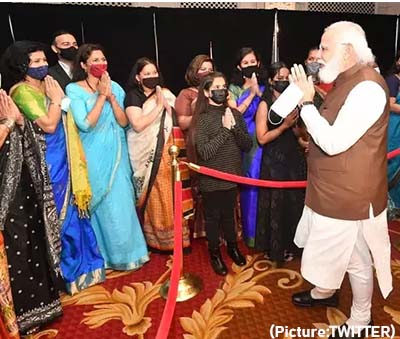 The diaspora factor was also very evident at PM Modi’s meeting with US Vice President Kamala Harris. He told Harris “between India and the US, we have very vibrant and strong people-to-people connections, you know that all too well,” referring to her Indian roots.
The diaspora factor was also very evident at PM Modi’s meeting with US Vice President Kamala Harris. He told Harris “between India and the US, we have very vibrant and strong people-to-people connections, you know that all too well,” referring to her Indian roots. 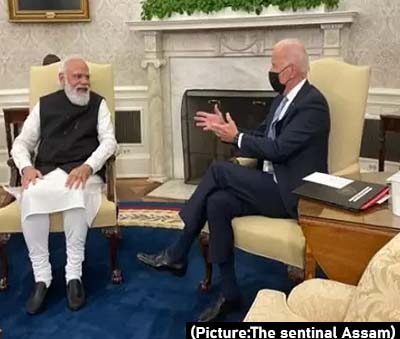 Modi echoed the sentiments. “Today’s bilateral summit is important. We are meeting at the start of the third decade of this century,” said Prime Minister Modi. “Your leadership will certainly play an important role in how this decade is shaped. The seeds have been sown for an even stronger friendship between India and USA,” he added. “The Prime Minister and I are going to be talking today about what more we can do to fight Covid-19, take on the climate challenges that the world face(s), and ensure stability in the Indo-Pacific, including with our own Quad partners,” President Biden detailed.
Modi echoed the sentiments. “Today’s bilateral summit is important. We are meeting at the start of the third decade of this century,” said Prime Minister Modi. “Your leadership will certainly play an important role in how this decade is shaped. The seeds have been sown for an even stronger friendship between India and USA,” he added. “The Prime Minister and I are going to be talking today about what more we can do to fight Covid-19, take on the climate challenges that the world face(s), and ensure stability in the Indo-Pacific, including with our own Quad partners,” President Biden detailed.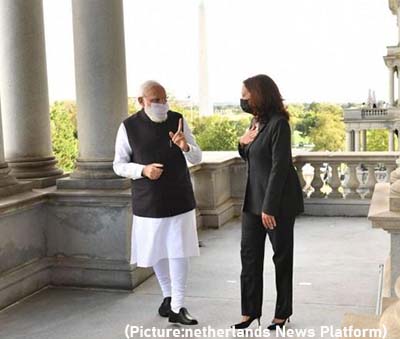 Harris praised India for stepping forward to help other countries with vaccines at the outset of the pandemic. Prime Minister Modi praised the leadership of the new administration in overcoming challenges besetting the country.
Harris praised India for stepping forward to help other countries with vaccines at the outset of the pandemic. Prime Minister Modi praised the leadership of the new administration in overcoming challenges besetting the country.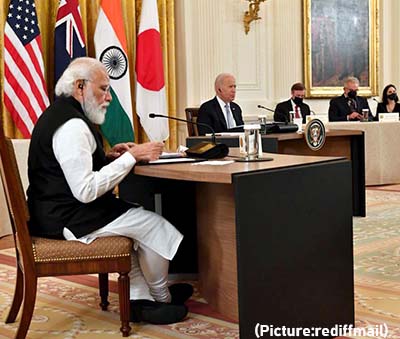 In November 2017, India, Japan, the U.S. and Australia gave shape to the long-pending proposal of setting up
In November 2017, India, Japan, the U.S. and Australia gave shape to the long-pending proposal of setting up 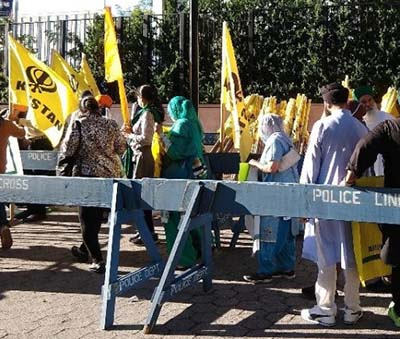 The rally was sponsored by 21 organizations under the banner of Coalition to Stop Genocide in India, including Ambedkar International Center, Ambedkar King Study Circle, Black Lives Matter, Coalition Against Fascism in India, Dalit Solidarity Forum, New York City Democratic Socialists’ Racial Justice Working Group, Federation of Indian American Christian Organizations of North America, Hindus for Human Rights, Indian American Muslim Council, India Civil Watch International, International Commission for Dalit Rights, Jewish Voice for Peace, MICAH Faith Institute, Muslim Community Network, National Coalition against Caste Discrimination in the USA, NY Sikh Council, New York State Council of Churches, SALAM, Students Against Hindutva Ideology, and Voices Against Fascism in India.
The rally was sponsored by 21 organizations under the banner of Coalition to Stop Genocide in India, including Ambedkar International Center, Ambedkar King Study Circle, Black Lives Matter, Coalition Against Fascism in India, Dalit Solidarity Forum, New York City Democratic Socialists’ Racial Justice Working Group, Federation of Indian American Christian Organizations of North America, Hindus for Human Rights, Indian American Muslim Council, India Civil Watch International, International Commission for Dalit Rights, Jewish Voice for Peace, MICAH Faith Institute, Muslim Community Network, National Coalition against Caste Discrimination in the USA, NY Sikh Council, New York State Council of Churches, SALAM, Students Against Hindutva Ideology, and Voices Against Fascism in India.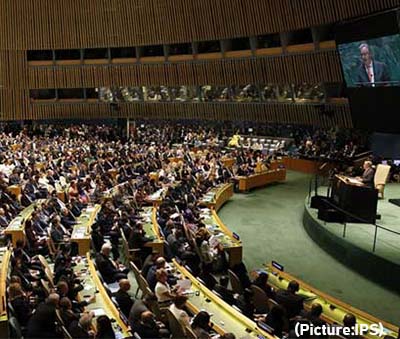 If that did happen, the Taliban would have earned the dubious distinction of being the only government in the world to hang two presidents. But mercifully, it did not. Ghani, however, denied that he had bolted from the presidential palace lugging several suitcases with millions of dollars pilfered from the country’s treasury. Meanwhile, when the Taliban ruled Afghanistan during 1996-2001, only three countries recognized its legitimacy: Pakistan, Saudi Arabia and UAE.
If that did happen, the Taliban would have earned the dubious distinction of being the only government in the world to hang two presidents. But mercifully, it did not. Ghani, however, denied that he had bolted from the presidential palace lugging several suitcases with millions of dollars pilfered from the country’s treasury. Meanwhile, when the Taliban ruled Afghanistan during 1996-2001, only three countries recognized its legitimacy: Pakistan, Saudi Arabia and UAE.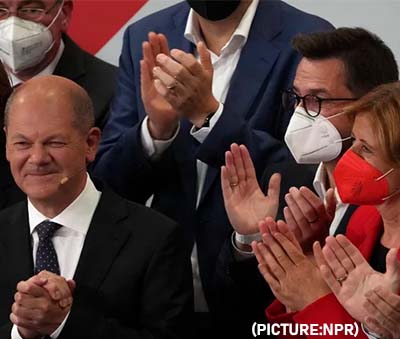 SPD leader Olaf Scholz said he had a clear mandate to form a government, while his conservative rival Armin Laschet remains determined to fight on. The Social Democrats’ candidate Olaf Scholz, the outgoing vice chancellor and finance minister who pulled his party out of a years-long slump, said the outcome was “a very clear mandate to ensure now that we put together a good, pragmatic government for Germany.”
SPD leader Olaf Scholz said he had a clear mandate to form a government, while his conservative rival Armin Laschet remains determined to fight on. The Social Democrats’ candidate Olaf Scholz, the outgoing vice chancellor and finance minister who pulled his party out of a years-long slump, said the outcome was “a very clear mandate to ensure now that we put together a good, pragmatic government for Germany.” It’s been a rapid descent for Biden. As late as June, 56% approved of how he was doing while only 40% disapproved. The decline began in July (50% approve/46% disapprove) and in August roughly the same number approved (49%) as disapproved (48%). The decline in Biden’s numbers is almost entirely attributable to independents souring on him. In June, 55% of those not affiliated with either party approved of how Biden was handling the presidency. Today that number sits at just 37%.
It’s been a rapid descent for Biden. As late as June, 56% approved of how he was doing while only 40% disapproved. The decline began in July (50% approve/46% disapprove) and in August roughly the same number approved (49%) as disapproved (48%). The decline in Biden’s numbers is almost entirely attributable to independents souring on him. In June, 55% of those not affiliated with either party approved of how Biden was handling the presidency. Today that number sits at just 37%. 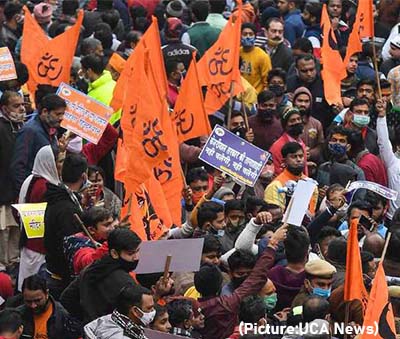 Located in western Madhya Pradesh, bordering Baroda, this district had witnessed similar unrest when Azad Prem Singh, a local leader of Vishwa Hindu Parishad (VHP) or World Hindu Council, had demanded the closure of all churches in the area earlier this year. Although Singh focused on Jhabua and surrounding tribal-dominated districts, the continued escalation of communal threats could have repercussions across the country, particularly in states like Madhya Pradesh which have enacted the anti-conversions laws.
Located in western Madhya Pradesh, bordering Baroda, this district had witnessed similar unrest when Azad Prem Singh, a local leader of Vishwa Hindu Parishad (VHP) or World Hindu Council, had demanded the closure of all churches in the area earlier this year. Although Singh focused on Jhabua and surrounding tribal-dominated districts, the continued escalation of communal threats could have repercussions across the country, particularly in states like Madhya Pradesh which have enacted the anti-conversions laws.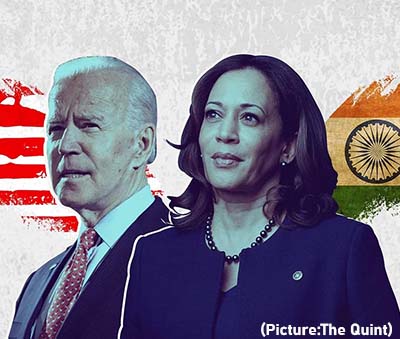 FIACONA has urged the President Biden and Vice President Harris “to be more direct and explicit in expressing that India should not and could not afford to go down the path of religious nationalism at the expense of pluralist democratic principles that values Christian and other religious segments of the population. Should Modi and his party choose to continue down this path of religious nationalism despite warnings from leaders of the free world, there is no reason to assume that India would end up any better than Pakistan, Sri Lanka, or Myanmar in that region, thus jeopardizing the stability and commerce in the Indo-Pacific region.”
FIACONA has urged the President Biden and Vice President Harris “to be more direct and explicit in expressing that India should not and could not afford to go down the path of religious nationalism at the expense of pluralist democratic principles that values Christian and other religious segments of the population. Should Modi and his party choose to continue down this path of religious nationalism despite warnings from leaders of the free world, there is no reason to assume that India would end up any better than Pakistan, Sri Lanka, or Myanmar in that region, thus jeopardizing the stability and commerce in the Indo-Pacific region.”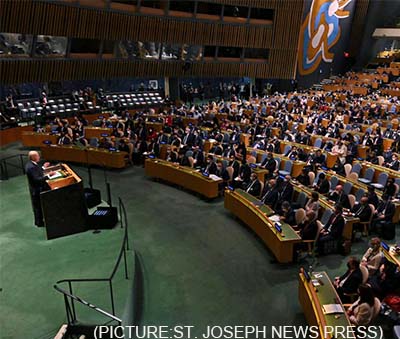 Biden used his address to describe a world where American civic leadership, rather than military power, acts as the driving force to resolve persistent problems like coronavirus,
Biden used his address to describe a world where American civic leadership, rather than military power, acts as the driving force to resolve persistent problems like coronavirus, 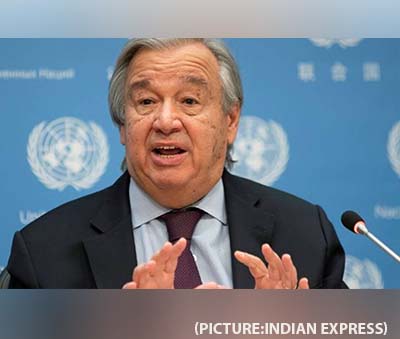 Guterres said the world’s two major economic powers should be cooperating on climate and negotiating more robustly on trade and technology even given persisting political fissures about
Guterres said the world’s two major economic powers should be cooperating on climate and negotiating more robustly on trade and technology even given persisting political fissures about 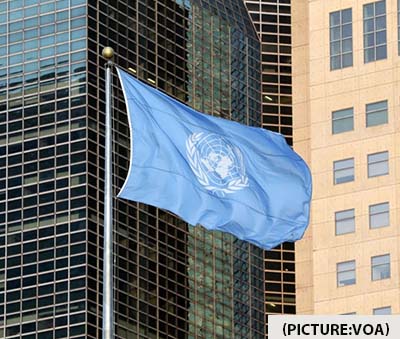 So on Monday, Guterres and United Kingdom Prime Minister Boris Johnson are hosting a closed-door session with 35 to 40 world leaders to get countries to do more leading up to the huge climate negotiations in Scotland in six weeks. Those negotiations in the fall are designed to be the next step after the
So on Monday, Guterres and United Kingdom Prime Minister Boris Johnson are hosting a closed-door session with 35 to 40 world leaders to get countries to do more leading up to the huge climate negotiations in Scotland in six weeks. Those negotiations in the fall are designed to be the next step after the  He added, “Modi and Biden will review the robust and multifaceted ties between the India and the US. They will also deliberate on ways to further enrich India-US global partnership.”
He added, “Modi and Biden will review the robust and multifaceted ties between the India and the US. They will also deliberate on ways to further enrich India-US global partnership.” 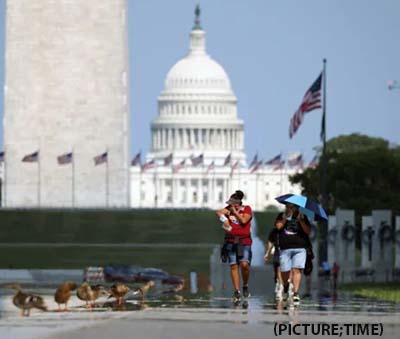 In other words, she said, lawmakers cannot squeeze giving eight million immigrants a pathway to legal citizenship into a legislative
In other words, she said, lawmakers cannot squeeze giving eight million immigrants a pathway to legal citizenship into a legislative 
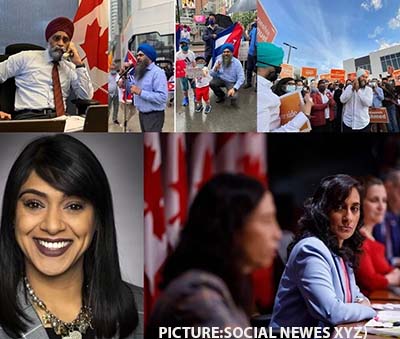 The main opposition Conservative Party ended up with a tally of 122 seats one up from the dissolved House. This is Trudeau’s third federal election win, but his critics say the poll was a waste of time. As many as 17 Indo-Canadians were elected to the Canadian Parliament during the elections held on Monday, September 20th. The Jagmeet Singh-led New Democratic Party (NDP) will again hold the balance of power as it increased its tally from 24 to 27. NDP leader Jagmeet Singh also retained his Burnaby South seat in British Columbia. Among the 17 Indo-Canadian winners are Jagmeet Singh, former Minister Tim Uppal and three current Cabinet Ministers Harjit Singh Sajjan, Bardish Chagger and Anita Anand. Defense Minister Harjit Singh Sajjan again won from Vancouver South by beating Sukhbir Gill of the Conservative Party.
The main opposition Conservative Party ended up with a tally of 122 seats one up from the dissolved House. This is Trudeau’s third federal election win, but his critics say the poll was a waste of time. As many as 17 Indo-Canadians were elected to the Canadian Parliament during the elections held on Monday, September 20th. The Jagmeet Singh-led New Democratic Party (NDP) will again hold the balance of power as it increased its tally from 24 to 27. NDP leader Jagmeet Singh also retained his Burnaby South seat in British Columbia. Among the 17 Indo-Canadian winners are Jagmeet Singh, former Minister Tim Uppal and three current Cabinet Ministers Harjit Singh Sajjan, Bardish Chagger and Anita Anand. Defense Minister Harjit Singh Sajjan again won from Vancouver South by beating Sukhbir Gill of the Conservative Party. Modi will then travel to New York, where he will address the 76th session of the United Nations General Assembly (UNGA) on Saturday morning. On September 25, Mr. Modi is scheduled to be the first speaker at the U.N. The theme for the general debate is: “Building resilience through hope to recover from COVID-19, rebuild sustainably, respond to the needs of the planet, respect the rights of people and revitalize the United Nations.”
Modi will then travel to New York, where he will address the 76th session of the United Nations General Assembly (UNGA) on Saturday morning. On September 25, Mr. Modi is scheduled to be the first speaker at the U.N. The theme for the general debate is: “Building resilience through hope to recover from COVID-19, rebuild sustainably, respond to the needs of the planet, respect the rights of people and revitalize the United Nations.”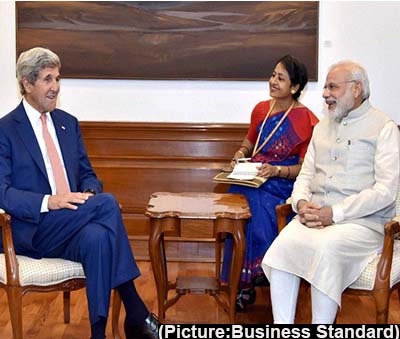 John Kerry along with Indian officials announced the Climate Action and Finance Mobilization dialogue, one of the two main tracks of the US-India Agenda 2030 Partnership that US President Joe Biden and Prime Minister Modi announced at the Leaders Summit on Climate in April this year. The CAFMD has three parts – the first being the climate action segment under which the US and India would develop proposals to curb emissions, Kerry said. The second was finance mobilization which would focus on attracting capital and technologies for India to scale up its renewable energy generation to its announced generation target of 450 GigaWatts. Over the past months, six of the largest banks in America had publicaly committed to investing a minimum of $ 4.16 trillion in the next 10 years to make the transition happen, the US envoy said. The third was climate adaptation and resilience that included efforts like extending India’s forest cover, he said.
John Kerry along with Indian officials announced the Climate Action and Finance Mobilization dialogue, one of the two main tracks of the US-India Agenda 2030 Partnership that US President Joe Biden and Prime Minister Modi announced at the Leaders Summit on Climate in April this year. The CAFMD has three parts – the first being the climate action segment under which the US and India would develop proposals to curb emissions, Kerry said. The second was finance mobilization which would focus on attracting capital and technologies for India to scale up its renewable energy generation to its announced generation target of 450 GigaWatts. Over the past months, six of the largest banks in America had publicaly committed to investing a minimum of $ 4.16 trillion in the next 10 years to make the transition happen, the US envoy said. The third was climate adaptation and resilience that included efforts like extending India’s forest cover, he said. To commemorate the day, hundreds of people on Saturday gathered in Lower Manhattan at the National September 11 Memorial & Museum on the spot where the World Trade Center’s twin towers once stood. Three presidents — President Biden, former Presidents Barack Obama and Bill Clinton — and their wives attended. They wore blue ribbons and held their hands over their hearts as a procession marched a flag through the memorial and stood somberly side by side as the names of the dead were read off by family members and stories and remembrances were shared.
To commemorate the day, hundreds of people on Saturday gathered in Lower Manhattan at the National September 11 Memorial & Museum on the spot where the World Trade Center’s twin towers once stood. Three presidents — President Biden, former Presidents Barack Obama and Bill Clinton — and their wives attended. They wore blue ribbons and held their hands over their hearts as a procession marched a flag through the memorial and stood somberly side by side as the names of the dead were read off by family members and stories and remembrances were shared. The hijackers had trained at the group’s camps in Afghanistan. They received money and instructions from its leadership. And ultimately, they were sent to the U.S. to carry out al-Qaida’s “planes operation.” President George W Bush gave an address in front of the damaged Pentagon following the Sept. 11 terrorist attack there as Counselor to the President Karen Hughes and Secretary of Defense Donald Rumsfeld stand by. As the nation mourned the nearly 3,000 people who were killed on 9/11, the George W. Bush administration frantically tried to find its footing and prevent what many feared would be a second wave of attacks. President Bush ordered members of his administration, including top counterterrorism official Richard Clarke, to imagine what the next attack could look like and take steps to prevent it.
The hijackers had trained at the group’s camps in Afghanistan. They received money and instructions from its leadership. And ultimately, they were sent to the U.S. to carry out al-Qaida’s “planes operation.” President George W Bush gave an address in front of the damaged Pentagon following the Sept. 11 terrorist attack there as Counselor to the President Karen Hughes and Secretary of Defense Donald Rumsfeld stand by. As the nation mourned the nearly 3,000 people who were killed on 9/11, the George W. Bush administration frantically tried to find its footing and prevent what many feared would be a second wave of attacks. President Bush ordered members of his administration, including top counterterrorism official Richard Clarke, to imagine what the next attack could look like and take steps to prevent it. Their statement says: “Today, we are paying the price [of the climate emergency] … Tomorrow could be worse.” It concludes: “This is a critical moment. Our children’s future and the future of our common home depend on it.” The faith leaders have asked people to pray for world leaders ahead of Cop26, the global environment summit in Glasgow this autumn, and for individuals to make “meaningful sacrifices for the sake of the planet, working together and taking responsibility for how we use our resources”.
Their statement says: “Today, we are paying the price [of the climate emergency] … Tomorrow could be worse.” It concludes: “This is a critical moment. Our children’s future and the future of our common home depend on it.” The faith leaders have asked people to pray for world leaders ahead of Cop26, the global environment summit in Glasgow this autumn, and for individuals to make “meaningful sacrifices for the sake of the planet, working together and taking responsibility for how we use our resources”.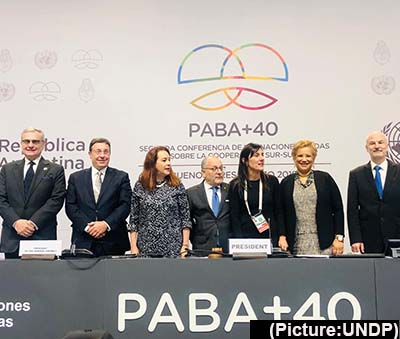 The
The  “As of today, nearly 5,500 Indian peacekeepers are deployed across nine UN missions,” she said. India takes pride in the fact that the first-ever all-women peacekeeping contingent was from India and stationed in Liberia, Lekhi added. “Due to their dedication, professionalism and motivation, the all-female FPU proved to be strong, visible role models, gaining world-wide attention and illustrating the significant contribution that women can make towards global peace and security.” She said that UN Peacekeeping Missions have been playing an important role in bringing about peace and stability in countries of deployment, despite numerous operational challenges. “One of the major operational challenges that continue to hamper peacekeeping operations has been the transition phase from peacekeeping to peacebuilding,” Lekhi noted.
“As of today, nearly 5,500 Indian peacekeepers are deployed across nine UN missions,” she said. India takes pride in the fact that the first-ever all-women peacekeeping contingent was from India and stationed in Liberia, Lekhi added. “Due to their dedication, professionalism and motivation, the all-female FPU proved to be strong, visible role models, gaining world-wide attention and illustrating the significant contribution that women can make towards global peace and security.” She said that UN Peacekeeping Missions have been playing an important role in bringing about peace and stability in countries of deployment, despite numerous operational challenges. “One of the major operational challenges that continue to hamper peacekeeping operations has been the transition phase from peacekeeping to peacebuilding,” Lekhi noted. California topped the state-level caseload list, with 4,421,247 cases. Texas confirmed the second most cases of 3,706,980, followed by Florida with 3,352,451 cases, New York with 2,304,955 cases, and Illinois with more than 1.5 million cases. Other states with over 1 million cases include Georgia, Pennsylvania, Ohio, North Carolina, New Jersey, Tennessee, Michigan and Arizona, according to the university’s tally. The US remains the nation worst hit by the pandemic, with the world’s most cases and deaths, making up more than 18 per cent of the global caseload and nearly 14 per cent of the global deaths. US Covid-19 caseload reached 10 million on November 9, 2020, crossed 20 million on January 1, 2021, and exceeded 30 million on March 24.
California topped the state-level caseload list, with 4,421,247 cases. Texas confirmed the second most cases of 3,706,980, followed by Florida with 3,352,451 cases, New York with 2,304,955 cases, and Illinois with more than 1.5 million cases. Other states with over 1 million cases include Georgia, Pennsylvania, Ohio, North Carolina, New Jersey, Tennessee, Michigan and Arizona, according to the university’s tally. The US remains the nation worst hit by the pandemic, with the world’s most cases and deaths, making up more than 18 per cent of the global caseload and nearly 14 per cent of the global deaths. US Covid-19 caseload reached 10 million on November 9, 2020, crossed 20 million on January 1, 2021, and exceeded 30 million on March 24. Armed opposition
Armed opposition Lauren had left two messages that morning, as he slept with the phone ringer off in the bedroom. First, with good news that she was taking an earlier flight from New Jersey home to San Francisco. Then she called from the plane. There was “a little problem,” his wife said, but she was “comfortable for now.” She did not say she would call back, Grandcolas recalls. She said: “I love you more than anything, just know that. Please tell my family I love them too. Goodbye, honey.” “That moment I looked over at the television and there was a smoldering hole on the ground in Pennsylvania. They said it was United Flight 93,” said Grandcolas, 58. “That’s when I dropped to the ground.” All 44 people on board were killed. Lauren was 38 years old and three months pregnant with their first child. She had traveled East to attend her grandmother’s funeral in New Jersey, and then stayed a few extra days to announce the pregnancy — a little “good news to lift the spirits of her parents and sisters after burying their grandmother,” Grandcolas said.
Lauren had left two messages that morning, as he slept with the phone ringer off in the bedroom. First, with good news that she was taking an earlier flight from New Jersey home to San Francisco. Then she called from the plane. There was “a little problem,” his wife said, but she was “comfortable for now.” She did not say she would call back, Grandcolas recalls. She said: “I love you more than anything, just know that. Please tell my family I love them too. Goodbye, honey.” “That moment I looked over at the television and there was a smoldering hole on the ground in Pennsylvania. They said it was United Flight 93,” said Grandcolas, 58. “That’s when I dropped to the ground.” All 44 people on board were killed. Lauren was 38 years old and three months pregnant with their first child. She had traveled East to attend her grandmother’s funeral in New Jersey, and then stayed a few extra days to announce the pregnancy — a little “good news to lift the spirits of her parents and sisters after burying their grandmother,” Grandcolas said. This will be Modi’s first in-person meeting with Biden. The two have met virtually on at least three occasions — the Quad summit in March, the climate change summit in April, and the G-7 summit in June this year. Modi was supposed to travel to the UK for the G-7 summit where he could have met Biden, but had to cancel the trip due to the second Covid-19 wave across India. With the situation in Afghanistan unfolding rapidly, Modi’s visit is significant. Besides meeting Biden, he is expected to have important meetings with the top echelons of the US administration.
This will be Modi’s first in-person meeting with Biden. The two have met virtually on at least three occasions — the Quad summit in March, the climate change summit in April, and the G-7 summit in June this year. Modi was supposed to travel to the UK for the G-7 summit where he could have met Biden, but had to cancel the trip due to the second Covid-19 wave across India. With the situation in Afghanistan unfolding rapidly, Modi’s visit is significant. Besides meeting Biden, he is expected to have important meetings with the top echelons of the US administration. Why is Suga stepping aside after just a year in office?
Why is Suga stepping aside after just a year in office? When U.S. troops withdrew from Kabul’s Hamid Karzai International Airport within the stipulated time, the nation’s most prolonged war cost was more than $ 2.3 trillion. During the last 20 years, more than 2,400 U.S. service members have been killed in Afghanistan alone. World astonished to hear that even while retrieving, thirteen U.S. soldiers were killed in the latest suicide bombing in Kabul Airport. Taliban’s praise of China is aimed at gaining recognition for their government at the international level by establishing links with power like China. China and Pakistan are now the only countries in the region that fully support the Taliban.
When U.S. troops withdrew from Kabul’s Hamid Karzai International Airport within the stipulated time, the nation’s most prolonged war cost was more than $ 2.3 trillion. During the last 20 years, more than 2,400 U.S. service members have been killed in Afghanistan alone. World astonished to hear that even while retrieving, thirteen U.S. soldiers were killed in the latest suicide bombing in Kabul Airport. Taliban’s praise of China is aimed at gaining recognition for their government at the international level by establishing links with power like China. China and Pakistan are now the only countries in the region that fully support the Taliban. Stanley won his 18th District Assembly seat in a Special Election in January 2021, becoming the first South Asian to represent Middlesex County in the New Jersey Legislature. Stanley defeated fellow Democrat, Edison Councilman Joe Coyle by a vote of 189-136, a 58%-42% margin, according to the Middlesex County Democratic Organization. The seat became vacant when former Assemblywoman Nancy Pinkin resigned after being sworn in as the new Middlesex County Clerk.Endorsed by the Middlesex County Democratic Organization, Assemblyman Stanley was sworn in on January 27th, 2021. Stanley serves as a member of the
Stanley won his 18th District Assembly seat in a Special Election in January 2021, becoming the first South Asian to represent Middlesex County in the New Jersey Legislature. Stanley defeated fellow Democrat, Edison Councilman Joe Coyle by a vote of 189-136, a 58%-42% margin, according to the Middlesex County Democratic Organization. The seat became vacant when former Assemblywoman Nancy Pinkin resigned after being sworn in as the new Middlesex County Clerk.Endorsed by the Middlesex County Democratic Organization, Assemblyman Stanley was sworn in on January 27th, 2021. Stanley serves as a member of the  Stanley was born in the State of Karnataka, India and immigrated to Brooklyn, NY at a young age. For the last 21 years, he has called East Brunswick his home. While living there, he has worked in the finance industry as a title and life insurance agent, as well as a mortgage broker. Stanley is a proud father of three children and has been actively involved in the Middlesex County community, previously serving as a Trustee of the Lighthouse Christian Fellowship Church in East Brunswick and as President of the Fox Meadow Condominium Association. State Sen. Patrick Diegnan (D-South Plainfield) was among those who had supported the then East Brunswick Councilman Sterley Stanley for the Assembly Seat. “I’m supporting Sterley Stanley,” he said. “He’s a good guy and he works with me all the time.” At a February 8th meeting, the East Brunswick town council honored Stanley’s four years of local service. At the meeting, Stanley stated that one of his proudest achievements as Council President was helping to ensure that the governing body functioned as a cohesive unit. “We might have had differences of opinion and we have differences in the way we solve things, but at the end of the day, we all got together and did what was best for the Township,” Stanley said. “I feel honored now to not just represent East Brunswick, but the whole 18th District, and all seven towns that are there,” he said.
Stanley was born in the State of Karnataka, India and immigrated to Brooklyn, NY at a young age. For the last 21 years, he has called East Brunswick his home. While living there, he has worked in the finance industry as a title and life insurance agent, as well as a mortgage broker. Stanley is a proud father of three children and has been actively involved in the Middlesex County community, previously serving as a Trustee of the Lighthouse Christian Fellowship Church in East Brunswick and as President of the Fox Meadow Condominium Association. State Sen. Patrick Diegnan (D-South Plainfield) was among those who had supported the then East Brunswick Councilman Sterley Stanley for the Assembly Seat. “I’m supporting Sterley Stanley,” he said. “He’s a good guy and he works with me all the time.” At a February 8th meeting, the East Brunswick town council honored Stanley’s four years of local service. At the meeting, Stanley stated that one of his proudest achievements as Council President was helping to ensure that the governing body functioned as a cohesive unit. “We might have had differences of opinion and we have differences in the way we solve things, but at the end of the day, we all got together and did what was best for the Township,” Stanley said. “I feel honored now to not just represent East Brunswick, but the whole 18th District, and all seven towns that are there,” he said. Nearly 20 years after the US invaded Afghanistan to avenge the terror attacks of September 11, 2001, and strike at al Qaeda and the Taliban, which hosted Osama bin Laden, another American administration is leaving the country in the control of Taliban militants who still maintain close ties to al Qaeda and other terrorist organizations. President Joe Biden said the mission was accomplished years ago, with the killing of Osama bin Laden and the degrading of Al Qaeda. He said he would no longer put American troops in the middle of a civil war.
Nearly 20 years after the US invaded Afghanistan to avenge the terror attacks of September 11, 2001, and strike at al Qaeda and the Taliban, which hosted Osama bin Laden, another American administration is leaving the country in the control of Taliban militants who still maintain close ties to al Qaeda and other terrorist organizations. President Joe Biden said the mission was accomplished years ago, with the killing of Osama bin Laden and the degrading of Al Qaeda. He said he would no longer put American troops in the middle of a civil war. How we did this In 2019, roughly half of Hindu voters (49%) supported the BJP, giving the party a majority in the Lok Sabha – India’s lower house of parliament – and allowing Prime Minister Narendra Modi a
How we did this In 2019, roughly half of Hindu voters (49%) supported the BJP, giving the party a majority in the Lok Sabha – India’s lower house of parliament – and allowing Prime Minister Narendra Modi a  Biden’s approval rating on the coronavirus had consistently been in the 60s for the first six months of his presidency. That declined to the high 50s in July and has been sunk to the 50s in the month of August. Biden’s overall approval rating has declined at a similar rate to his coronavirus pandemic approval rating. The problem for Biden is that people are reacting to what they see on the ground. Coronavirus cases and hospitalizations are the
Biden’s approval rating on the coronavirus had consistently been in the 60s for the first six months of his presidency. That declined to the high 50s in July and has been sunk to the 50s in the month of August. Biden’s overall approval rating has declined at a similar rate to his coronavirus pandemic approval rating. The problem for Biden is that people are reacting to what they see on the ground. Coronavirus cases and hospitalizations are the  On its own, the polling slip was—and remains—inconsequential. But it does speak to a humming concern among some Democrats that Biden’s popularity isn’t absolute. The very narrow dip suggests that a break from the Donald Trump-era bombast was welcome for many Americans, but may be insufficient to guarantee a re-election. The economy is
On its own, the polling slip was—and remains—inconsequential. But it does speak to a humming concern among some Democrats that Biden’s popularity isn’t absolute. The very narrow dip suggests that a break from the Donald Trump-era bombast was welcome for many Americans, but may be insufficient to guarantee a re-election. The economy is  QUOTES
QUOTES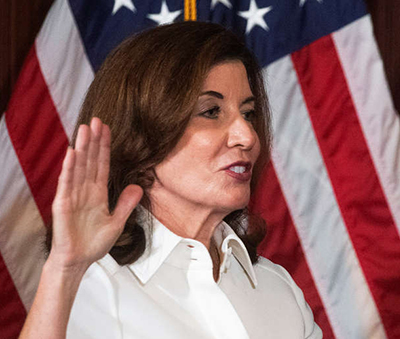 “I’ll tell New Yorkers I’m up to the task. And I’m really proud to be able to serve as their governor and I won’t let them down,” she said. Hochul’s ascent to the top job was a history-making moment in a capital. Where women have only recently begun chipping away at a notoriously male-dominated political culture. Kathy Hochul, serving as New York’s lieutenant governor, has catapulted into the national spotlight when Gov. Andrew Cuomo abruptly announced his resignation amid a growing sexual harassment scandal 2 weeks ago.
“I’ll tell New Yorkers I’m up to the task. And I’m really proud to be able to serve as their governor and I won’t let them down,” she said. Hochul’s ascent to the top job was a history-making moment in a capital. Where women have only recently begun chipping away at a notoriously male-dominated political culture. Kathy Hochul, serving as New York’s lieutenant governor, has catapulted into the national spotlight when Gov. Andrew Cuomo abruptly announced his resignation amid a growing sexual harassment scandal 2 weeks ago. Speaking from the White House, President
Speaking from the White House, President  Biden’s approval rating hitting the lowest point in his presidency this week at less than 50 percent. A
Biden’s approval rating hitting the lowest point in his presidency this week at less than 50 percent. A 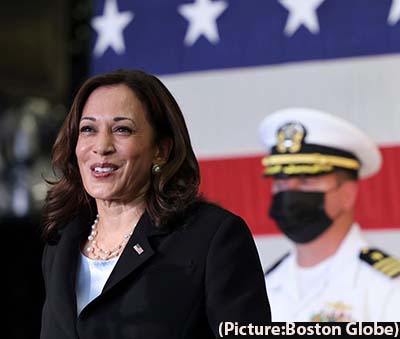 US
US  Tharoor, who attended the court proceedings virtually, thanked the court for discharging him of all offenses. “It had been seven and half years and it was a torture. I’m so grateful,” he said. Tharoor had been accused of subjecting his late wife to cruelty and abetting her suicide by Delhi Police, which had filed a detailed chargesheet in the matter. Pushkar’s body was discovered in a room of a five-star hotel in the capital on January 17, 2014. An FIR was registered by police a year later, on January 1, 2015, against unknown persons for murder. Tharoor was later booked under
Tharoor, who attended the court proceedings virtually, thanked the court for discharging him of all offenses. “It had been seven and half years and it was a torture. I’m so grateful,” he said. Tharoor had been accused of subjecting his late wife to cruelty and abetting her suicide by Delhi Police, which had filed a detailed chargesheet in the matter. Pushkar’s body was discovered in a room of a five-star hotel in the capital on January 17, 2014. An FIR was registered by police a year later, on January 1, 2015, against unknown persons for murder. Tharoor was later booked under  It was surprising, because until taking up arms just a year before, many of the fighters had been little more than religious pupils. Their very name meant “students.” The Taliban, they called themselves. A quarter-century later, after outlasting an international military coalition in a war that cost tens of thousands of lives, the onetime students are now rulers of the land. Again. Here is a look at the origin of the Taliban; how they managed to take over Afghanistan not once, but twice; what they did when they first took control — and what that might reveal about their plans for this time.
It was surprising, because until taking up arms just a year before, many of the fighters had been little more than religious pupils. Their very name meant “students.” The Taliban, they called themselves. A quarter-century later, after outlasting an international military coalition in a war that cost tens of thousands of lives, the onetime students are now rulers of the land. Again. Here is a look at the origin of the Taliban; how they managed to take over Afghanistan not once, but twice; what they did when they first took control — and what that might reveal about their plans for this time. In
In 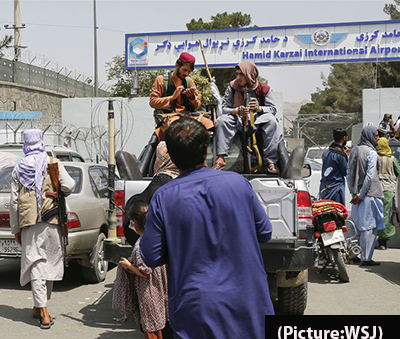 Most of them might not have served a single day in the
Most of them might not have served a single day in the  As the
As the  Lawmakers approved Democrats’ budget resolution on a party-line 50-49 vote, a crucial step for a president and party set on training the government’s fiscal might at assisting families, creating jobs and fighting climate change. Higher taxes on the wealthy and corporations would pay for much of it. Passage came despite an avalanche of Republican amendments intended to make their rivals pay a price in next year’s elections for control of Congress.
Lawmakers approved Democrats’ budget resolution on a party-line 50-49 vote, a crucial step for a president and party set on training the government’s fiscal might at assisting families, creating jobs and fighting climate change. Higher taxes on the wealthy and corporations would pay for much of it. Passage came despite an avalanche of Republican amendments intended to make their rivals pay a price in next year’s elections for control of Congress. Soon after he unfurled the national flag to mark nation’s 75th Independence Day at the historic Red Fort here, Modi addressed the nation, saying the infrastructure plan will create job opportunities for millions of Indian youth. “It will help local manufacturers turn globally competitive and also develop possibilities of new future economic zones in the country,” he said.
Soon after he unfurled the national flag to mark nation’s 75th Independence Day at the historic Red Fort here, Modi addressed the nation, saying the infrastructure plan will create job opportunities for millions of Indian youth. “It will help local manufacturers turn globally competitive and also develop possibilities of new future economic zones in the country,” he said. India decided to focus on all aspects of maritime security in a holistic manner as one of its signature events during its current presidency of the UNSC during August. India took a responsible yet consensus-building approach by initiating consultations amongst all UNSC members from several months in advance. A concept note was prepared that incorporated ideas of all.
India decided to focus on all aspects of maritime security in a holistic manner as one of its signature events during its current presidency of the UNSC during August. India took a responsible yet consensus-building approach by initiating consultations amongst all UNSC members from several months in advance. A concept note was prepared that incorporated ideas of all. Since the issue relating to the Farmer’s plight was central to the concerns of the Indian diaspora which had gathered, this prohibition would prevent them from venting their sentiments and showing support to the cause of the farmers, as a result of which it left them no choice but to stay put at the location and voice their bitter disappointment over the unfair and undemocratic imposition of conditions which prevented them from participating in celebrating the joyous occasion of the Independence Day of India while at the same time expressing serious concern on the inaction of the sitting government to resolve the issue.
Since the issue relating to the Farmer’s plight was central to the concerns of the Indian diaspora which had gathered, this prohibition would prevent them from venting their sentiments and showing support to the cause of the farmers, as a result of which it left them no choice but to stay put at the location and voice their bitter disappointment over the unfair and undemocratic imposition of conditions which prevented them from participating in celebrating the joyous occasion of the Independence Day of India while at the same time expressing serious concern on the inaction of the sitting government to resolve the issue. Chief Justice of India N V Ramana who, along with Justice Surya Kant, was hearing eight petitions seeking an independent probe into the matter, said: “No doubt, the allegations are serious, if the reports are true.” The Chief Justice of India’s Supreme Court, while stating that he was not getting into facts of each and every case, said: “You know there are provisions under the Telegraph Act, IT Act etc to file complaints. These are the things which bother us.”
Chief Justice of India N V Ramana who, along with Justice Surya Kant, was hearing eight petitions seeking an independent probe into the matter, said: “No doubt, the allegations are serious, if the reports are true.” The Chief Justice of India’s Supreme Court, while stating that he was not getting into facts of each and every case, said: “You know there are provisions under the Telegraph Act, IT Act etc to file complaints. These are the things which bother us.”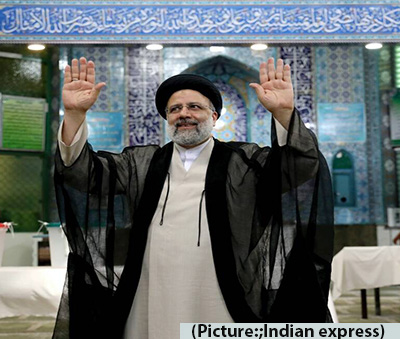 Iran appears eager to reciprocate. When Jaishankar was in Tehran last month on his way to Moscow, Raisi received him—making him the first foreign minister of any country to get that opportunity—and signaled Iran’s interest in stepping up cooperation with India. And in recent weeks, New Delhi and Tehran have
Iran appears eager to reciprocate. When Jaishankar was in Tehran last month on his way to Moscow, Raisi received him—making him the first foreign minister of any country to get that opportunity—and signaled Iran’s interest in stepping up cooperation with India. And in recent weeks, New Delhi and Tehran have  The agency said the halt should last at least two months, to give the world a chance to meet the director-general’s goal of vaccinating 10% of the population of every country by the end of September.
The agency said the halt should last at least two months, to give the world a chance to meet the director-general’s goal of vaccinating 10% of the population of every country by the end of September. The action came after the National Commission for Protection of Child Rights (NCPCR) issued a notice to Twitter India, asking the social media platform to remove the tweet which revealed the identity of the rape victim.
The action came after the National Commission for Protection of Child Rights (NCPCR) issued a notice to Twitter India, asking the social media platform to remove the tweet which revealed the identity of the rape victim. India on Sunday assumed the presidency of the United Nations Security Council for the month of August and is set to organize key events in three major areas of maritime security, peacekeeping and counter-terrorism.
India on Sunday assumed the presidency of the United Nations Security Council for the month of August and is set to organize key events in three major areas of maritime security, peacekeeping and counter-terrorism. In the 67 to 32 vote, 17 Republicans including Senate Minority Leader Mitch McConnell joined Democrats to advance the bill. The proposal includes some of President Biden’s top domestic priorities and provides billions of dollars in funding for bridges, roads, broadband internet, clean water, public transit and more over the next five years. It encapsulates so-called “hard” infrastructure and is separate from Democratic efforts to pass a $3.5 trillion package for so-called “soft” infrastructure, which includes policies like Medicare expansion and universal child care.
In the 67 to 32 vote, 17 Republicans including Senate Minority Leader Mitch McConnell joined Democrats to advance the bill. The proposal includes some of President Biden’s top domestic priorities and provides billions of dollars in funding for bridges, roads, broadband internet, clean water, public transit and more over the next five years. It encapsulates so-called “hard” infrastructure and is separate from Democratic efforts to pass a $3.5 trillion package for so-called “soft” infrastructure, which includes policies like Medicare expansion and universal child care. The context is the recently renovated
The context is the recently renovated  However, this does not give justice to hundreds of Christians and other minorities who sacrificed their lives due to the quest of the ruling party to declare India as a Hindu state. The poor departed souls must have been churning in their graves when they hear such statements. The injustices suffered by the 84-year-old Fr. Stan Sway alone should have been reason enough for Mr. Blinken to have been more cautious in his statements about human rights and respect for democratic principles by the government of India.
However, this does not give justice to hundreds of Christians and other minorities who sacrificed their lives due to the quest of the ruling party to declare India as a Hindu state. The poor departed souls must have been churning in their graves when they hear such statements. The injustices suffered by the 84-year-old Fr. Stan Sway alone should have been reason enough for Mr. Blinken to have been more cautious in his statements about human rights and respect for democratic principles by the government of India. These are not the only conflicts raging in 2021. There are many in Africa and a few still linger on in Asia and South America. And once again, Afghanistan, the country that defied Alex the Great, the Brits, the Russians and now the Americans and NATO, is set to move center stage on the humanitarian front.
These are not the only conflicts raging in 2021. There are many in Africa and a few still linger on in Asia and South America. And once again, Afghanistan, the country that defied Alex the Great, the Brits, the Russians and now the Americans and NATO, is set to move center stage on the humanitarian front.